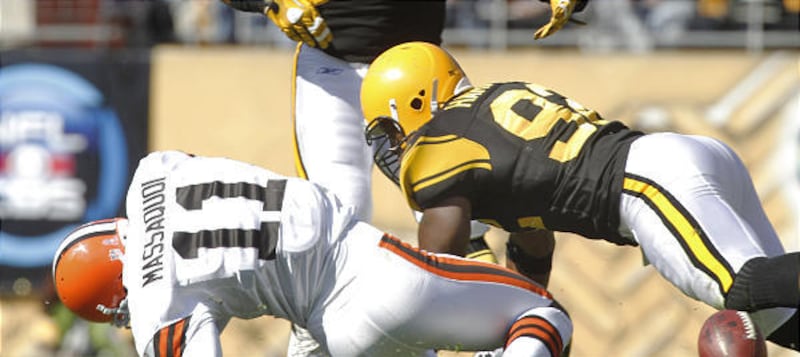On Sunday, more eyes than usual will be on the NFL as the league begins to strictly enforce safety initiatives that prohibit hits to the head, players' launching themselves into opponents, and other gratuitous hits against defenseless players.
Under the threat of stiffer penalties like suspensions, players will be scrutinized. They are being instructed to take new angles and concentrate their force on a new strike zone, which is essentially anywhere below the head.
This is a difficult transition, especially for defensive players brought up in an era when mind-numbing, bone-jarring hits are candidates to make "SportsCenter."
In some ways, NFL players are being made scapegoats in response to a news media outcry over the legalized mayhem known as professional football.
While hockey players regularly drop their gloves and pummel one another — some even take on fans — NFL players are being told, midstream, to curb instincts that have been cultivated since the sixth grade.
On the other hand, the NFL's knee-jerk reaction to the relative carnage of last Sunday could be beneficial if it encourages players to act less like blood-lusting gladiators and more like well-compensated professionals who play a uniquely violent game.
What may come out of this, oddly enough, is greater compassion among players, a recognition that they are all in this together, that they need one another. If the players don't know this now, they will in about five months when their owners lock them out.
Willie Lanier, regarded as one of the greatest middle linebackers in NFL history, had that epiphany 43 years ago during his first season with the Kansas City Chiefs.
Lanier was known as Contact in his rookie season because of his bruising head-first hitting style.
In the fifth game of his career, Lanier hit his head against the knee of a Chargers running back. "I recognized that it was a concussion," he said. "I didn't say anything about it at the time. I didn't fall to the ground, and I didn't have any pain."
A week later in a home game against Houston, Lanier collapsed while calling defensive signals. "I was out for two hours," he said. Lanier would not find out until the end of his career that his pulse was lost three times on the way to the hospital.
By the end of his rookie season, Lanier had changed nicknames, going from Contact to Honey Bear.
Lanier, like everyone else in his generation, had been trained to put the crown of his helmet between a ball carrier's numbers and hit, lift and drive. In the Honey Bear approach, he utilized his chest, shoulders and arms to wrap up, or bear hug, a ball carrier when bringing him down.
The change was not ordered by the Kansas City coaching, training or medical staffs. The league did not order it; indeed, the league did not know.
Lanier said he was not reacting to a rules change, but to the reality he had to change for his own sake. Lanier took ownership of his body. The current generation of active players needs to do the same.
"There is no way that I could have survived if I had not changed my style of play," Lanier said. He played 10 more seasons. He did not miss a game. He did not suffer any more concussions, and his tackling efficiency improved.
More significantly, Lanier said his mentality changed from one bent on destroying the opposition to one that ultimately looked out for his opponent. For the sake of the game, they needed one another. They needed the great players on the field.
"My reality was that if there was a defenseless player, if that person didn't touch the ball, I would not hit them," he said. "I was not going to strike you if you didn't have an opportunity to get the ball."
Former NFL running back Calvin Hill was one of the first beneficiaries of Lanier's enlightened attitude. Hill, who played for Dallas and Washington, recalled an exhibition game against the Chiefs when he hurtled over Lanier at the goal line to score.
"As we were going through the tunnel for halftime, Lanier said, 'Hey, man, I could have lit you up,' " Hill said, "and he told me why he didn't."
Lanier recalled the conversation. He said he told Hill the only reason he didn't hit him was that it was a preseason game. Lanier also told Hill that whenever he leaves his feet he puts himself at risk of serious injury.
Decades later, a number of contemporary players are beginning to make the same point. The Giants' Justin Tuck made the point last season.
"Guys have to change their mentality," he said. "We've got to really start taking care of each other. There's got to be something in your mind that says, 'I shouldn't be hitting this guy in his head and leading with my head.' " Athletes are told from childhood: don't think, react. Now the NFL is telling players to think first. At a number of levels, that is advice they should heed.

